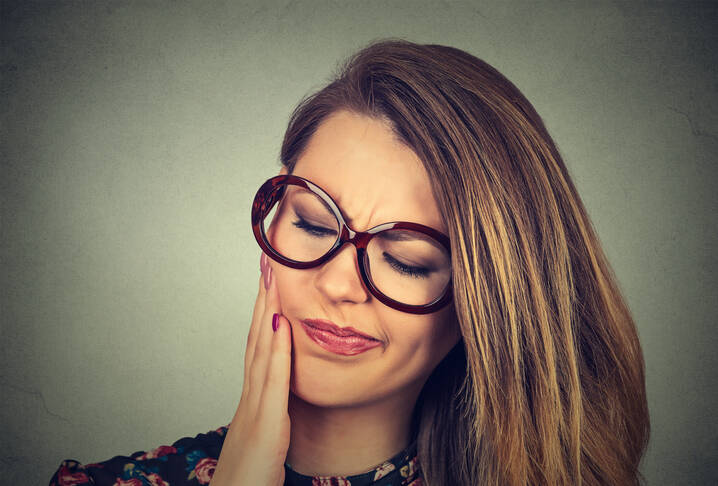- pediatriepropraxi.cz - aphthae and their treatment in children
Aphthae in children and in pregnancy: their causes, treatment and what helps with aphthae?

Aphthae are uncomfortable, inflamed blisters that occur on the lining of the oral cavity. These painful sores can especially afflict children and pregnant women. Why is this so?
Article content
What helps with aphthae and what is the treatment?
Aphthae are round or oval blisters, usually a few millimetres to a centimetre in size. These small inflamed blisters are white to yellowish, with a red border. Sometimes they can bleed.
The typical site of formation is the inside of the oral cavity, especially the cheeks, lips and tongue.
Although they can be really unpleasant, they usually do not require a doctor's visit. They are not dangerous. They do not pose any serious threat to health. They usually disappear on their own within one or two weeks.
Relief from the pain and discomfort caused by aphthae can be provided by various medicated ointments or oils that are freely available in pharmacies.
How and why do aphthae form?
The precursor to an aphthae is a lump or rash that bursts and turns into an ulcer. Usually more than one appears, but they do not merge.
This disease was described by the ancient Greeks. Today, it affects approximately 20% of the population worldwide.
In most cases, the reason for the formation of aphthae is unclear. Often, damage to the inner wall of the mouth and a certain risk factor are involved in their formation and contribute significantly to the formation of aphthae.
If you do develop an aphthae, it is very likely that it will get bigger or more will form at the same time.
An overview of causes and risk factors:
| Possible causes of aphthae | Risk factors | Diseases contributing to the development of aphthae |
|
|
|
Stress is cited by many experts as the main risk factor for developing aphthae. Another common risk factor is hormonal changes or a weakened immune system.
Although aphthae are an inflammatory disease, they are not infectious. They are therefore not transmissible from person to person.
Also read the magazine article on how to choose a toothbrush. This will help you avoid unnecessary injury with the wrong toothbrush.
When to see a doctor?
Although aphthae are both unpleasant and painful, in most cases they are not a serious condition. Therefore, they do not require medical treatment. However, if you are not sure whether it is really an aphthae or if aphthae are causing you more trouble, see your doctor.
When home treatment is not enough:
- Aphthae are very painful, excessively reddened
- they return repeatedly
- do not disappear within three weeks
- otherwise make normal activities and eating impossible
Aphthae and Candida albicans
The yeast fungus Candida albicans is a major contributor to the development of aphthae. This type of yeast is naturally found in the oral cavity but is a risk factor when it overgrows.
A weakened immune system is unable to maintain the natural amount of this fungus, and it multiplies. This creates a favourable environment for the formation of aphthae.
The proliferation of Candida is also facilitated by antibiotic treatment, which reduces the number of beneficial bacteria in the mouth and allows the yeast to multiply.
How to cure aphthae?
As the cause of aphthae is not yet fully understood, the treatment is not clear. It is more about relieving symptoms and relieving pain. It is difficult to treat something where the cause is unknown.
Fortunately, aphthae do not require any special treatments or therapies. Aphthae normally disappear within two weeks.
However, in many cases, aphthae can make normal activities such as eating uncomfortable, especially if they are located in areas that are frequently irritated.
If you are not sure whether it is really aphthae or whether they are making normal activities very uncomfortable, contact your doctor. He or she will use various examinations to determine the possible cause or rule out other possible diseases that can cause aphthae or other blisters.
It is also possible that, in addition to laboratory tests, he or she may refer you to a dentist, immunologist or allergist.
What to do if you are bothered by aphthae
- Use a soft toothbrush to brush your teeth
- use toothpaste that does not contain sodium sulfate
- Avoid spicy, spicy, sour, salty or hot foods
- eat more fruits and vegetables rich in vitamins
- relax
Various antimicrobial mouthwashes, lozenges, gels or sprays can help. However, they are limited in children and pregnancy.
If you prefer help from nature, you can try a rinse of sage, chamomile, etc. Maybe not very fragrant, but rubbing with garlic or onion is effective.
There are also corticosteroid lozenges that will ease the pain and speed up healing. But they are not suitable in pregnancy and for children under 12.
Prevention is of great importance, especially vitamins. It is recommended to take vitamin B, but also vitamin C, which helps to strengthen immunity.
Aphthae often affect children
Children and adolescents are often affected by aphthae. One reason for this is their immature immune system. Children's immune systems are still developing. Therefore, children are much more sensitive to infections.
It also often occurs in connection with a viral infection or a disease called dirty hands disease. It can form one of the symptoms of this disease.
Read also the article.
Inadequate oral hygiene skills also contribute to the higher incidence rate in children. This is especially the case when it comes to proper brushing of teeth. Children need to be helped and guided towards good hygiene habits. When you take proper care of your child's oral cavity, you will also avoid tooth decay.
You may also be interested in the articles.
In younger children, the appearance of mouth ulcers is often associated with food refusal. Painful blisters can cause them pain when taking food. If your child has suddenly started to refuse milk, for example, make sure that the aforementioned mouth ulcer has not formed.
Are aphthae dangerous in pregnancy?
Pregnancy is a strain on the entire organism. This period requires a higher intake of vitamins and minerals. The body manages them especially for the benefit of the unborn child.
The consumption of vitamins and other important substances varies at different stages of pregnancy. It is easy to develop a deficiency and consequently a weakening of immunity. This is a significant risk factor for the development of aphthae. Therefore, aphthae are very common in pregnancy.
Another triggering factor in pregnancy is hormonal changes. Similarly, this is also the case during menstruation.
Although aphthae can be very distressing for mothers-to-be, they do not pose any risk to the pregnancy - or to the baby!
How to treat aphthae in pregnancy
In pregnancy, any treatment should be approached with caution. This is also the case when treating aphthae. Many preparations contain alcohol and other substances that are dangerous for pregnancy. Therefore, consult your doctor or pharmacist for treatment.
There are no proven treatments that can speed up treatment or prevent recurrence. Even in pregnancy, aphthae usually resolve themselves within one to two weeks. It is important that the expectant mother maintains a varied and balanced diet and gets enough rest.
You may also be interested in the article.
Interesting resources
Related










